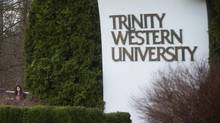
Kathmandu (Pahichan) August 3 – Supreme Court Justice Richard Wagner says he did not purposely exclude LGBTQ advocacy groups from participating in a major case pitting equality rights against religious freedom.
Justice Wagner, a leading candidate for chief justice, has been under fire since Thursday, when he rejected all four LGBTQ groups that applied to intervene in the case of a Christian law school, Trinity Western University, that requires students to sign a code of conduct limiting sexual intimacy to heterosexual marriage. Intervenors are not directly involved in a case, but bring their perspectives to broaden the court’s views.
On Monday, Chief Justice Beverley McLachlin undid that exclusion. Neither Justice Wagner’s initial order, nor the Chief Justice’s change of it, came with an explanation. The court’s practice is never to explain why it accepts or rejects particular intervenors.
“She was looking for me and I was looking for her,” Justice Wagner said in an interview with The Globe. “We talked over the phone and discussed the matter, and we decided that it would be best to add another day, and have all the applications granted.” All 26 have now been given permission to intervene.
“There was no intent to exclude. I was convinced that some intervenors for which I accepted the application in fact will convey the interests, preoccupations and concerns of members of the LGBTQ” community. “You have to decide sometimes. It’s a judgment call, and that’s what I’ve done.”
(The court, clearly sensitive to concerns it had acted in an exclusionary way, also issued an unprecedented news release explaining its process and reasons for its two decisions on the matter.)
Justice Wagner mentioned a speech he gave on equality rights at the University of Ottawa in March. (“Seeing things from another perspective is both an obligation and a work in progress,” he said in the speech.) “I would be the last one to give the false impression that I have no consideration for specific groups like the LGBTQ,” he said in the interview. “The last one.”
Legal observers, including some lawyers directly involved in the case, called his exclusion of LGBTQ groups puzzling, “weird” and troubling. “I think that Wagner did a disservice to the court and to the court’s multiple audiences,” University of Toronto law professor David Schneiderman, who is not involved in the case, told The Globe.
Justice Wagner is the court’s senior francophone judge, and is thus a front-runner to succeed Chief Justice McLachlin when she retires at the end of this year. The leadership role usually, though not always, goes back and forth between anglophone and francophone judges. Prime Minister Justin Trudeau has stressed the importance of diversity in the appointment of Supreme Court judges, and the federal Justice Department for the first time is keeping track of the number of LGBTQ applicants and appointees for the federal bench.
The optics of Justice Wagner’s decision had become an issue among some LGBTQ advocates. The initial exclusion “created some questions for a lot of members in the community about what perspectives won’t be represented in the court,” Paul Saguil, a Toronto lawyer representing two groups now accepted as intervenors, said in an interview.
“It is crucial that the Supreme Court hears directly from LGBTQ organizations because they represent the interests of those being excluded by TWU,” said Kyle Kirkup, a professor at the University of Ottawa’s law school.
Some legal observers defended Justice Wagner.
“His job was to consider which ones are best able to assist the Court – ultimately, that’s the role of an intervenor, not to be an advocacy group,” said Eugene Meehan, a former executive legal officer for the court, and a lawyer at Supreme Advocacy in Ottawa, which specializes in the Supreme Court. “That’s not optics, that’s doing the judicial job, exercising one’s judgment thereon.” He said, though, that his firm is not aware of any other case in which the court had varied an order on intervenors.
The Trinity Western case involves two separate appeals, one from British Columbia and one from Ontario, on the question of whether law societies may refuse to license graduates of the Christian law school in Langley, B.C. That made it difficult to hear from all the intervenors in one day.
Chief Justice McLachlin’s change to the lineup of intervenors raised questions among legal scholars as to the legal basis for her action.
“Constitutional law profs and Supreme Court observers have been trying to find the source of the Chief Justice’s legal authority to vary the order as soon as it came out,” Hugo Cyr, dean of political science and law at the University of Quebec at Montreal, said in an e-mail. “The legal basis for this varying order is far from clear.”
Several legal scholars interviewed said the court should consider being more transparent in deciding which intervenors it accepts or rejects.
“The bigger picture is that intervention itself is highly discretionary and the Court does not issue reasons for its decisions,” University of Ottawa law professor Carissima Mathen said.
Copy : https://www.theglobeandmail.com
Copyright © All right reserved to pahichan.com Site By: Sobij.